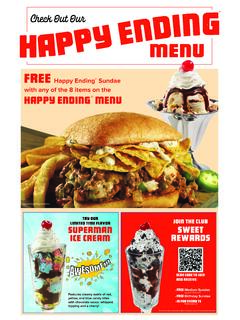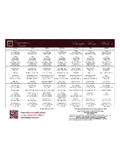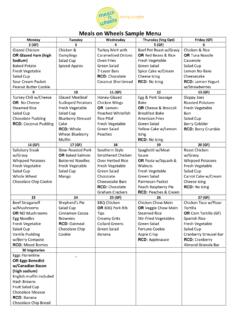Transcription of Suggested Meal Plan for a Hypoglycemia Diet
1 Suggested Meal Plan for A. Hypoglycemia Diet 2,000 Calories 1,500 Calories Before starting any diet, ask a doctor. Please read my comments below. 233 gm Carbohydrate, 149 gm Carbohydrate 98 gm Protein, 80 gm Fat 76 gm Protein, 65 gm Fat Morning Meal Fruit 1 Exchange 1 Exchange Egg or Meat 1 Exchange 1 Exchange Bread 2 Exchange 1 Exchange Fat 1 Exchange 1 Exchange Milk, 2% 1 Exchange 1 Exchange Beverage As Desired As Desired Mid-morning Meal Meat 1 Exchange 1 Exchange Bread 1 Exchange 1 Exchange Fruit 1 Exchange 0. Fat 1 Exchange 0. Noon Meal Meat, Fish, Cheese, Poultry 2 Exchange 2 Exchange Bread 2 Exchange 1 Exchange Vegetable, Raw 1 or 2 Exchange 1 or 2 Exchange Fruit 1 Exchange 1 Exchange Fat 2 Exchange 1 Exchange Beverage As Desired As Desired Mid-afternoon Meal Meat 1 Exchange 0.
2 Bread 2 Exchange 1/2 Exchange Fat 1 Exchange 0. Milk, 2% 0 1/2 Exchange Evening Meal Meat, Fish, Cheese, Poultry 2 Exchange 2 Exchange Bread 2 Exchange 1 Exchange Vegetable 1 Exchange 2 Exchange Vegetable, Raw As Desired As Desired Dessert, Sugar-free As Desired As Desired Fat 2 Exchange 1 Exchange Beverage As Desired As Desired Bedtime Bread 1 Exchange 1/2 Exchange Milk, 2% 1 Exchange 1/2 Exchange The Hypoglycemia Diet - General Guidelines The goal of treatment for Hypoglycemia is to delay the absorption of food. This can be accomplished through changes in eating habits. Follow these general guidelines: Do not eliminate carbohydrate from the diet.
3 Increase your intake of complex carbohydrates (starches). These foods are absorbed more slowly than simple carbohydrates and therefore do not cause rapid changes in blood sugar levels. Examples of complex carbohydrates are breads, cereals, pasta, rice, vegetables, and legumes. Avoid foods high in simple carbohydrates such as jams, jellies, table sugar, honey syrup, molasses, pies, candy, cakes, cookies, pastries and soda pop. Increase your intake of fiber. Fiber is the indigestible portion of Fruits, vegetables, legumes and grains. Carbohydrates are absorbed more slowly when they are part of a high fiber meal.
4 Eat Fruit-fresh of canned without sugar - rather than drinking juice. The added fiber will slow down sugar absorption. Eat smaller meals with snacks between meals and at bedtime. Avoid foods and beverages containing caffeine often produces the same symptoms as Hypoglycemia and may make you feel worse. Avoid alcoholic beverages. Alcohol lowers blood sugar levels, especially on an empty stomach. Maintain of achieve desirable body weight. Excess weight interferes with the body's ability to use insulin. Decrease you fat intake. A high-fat diet has been shown to interfere with insulin use. Because fat is high in calories, decreasing fat intake will also help you lose weight.
5 If you are at your desirable body weight, replace calories from fat with calories from complex carbohydrates. Occasionally you may need to change your plan. Here are some easy substitutions: Starch Exchange To omit one Starch Exchange: Add Fruit Exchange. To add one Starch Exchange: Omit one Fruit Exchange. Meat Exchange To omit one Meat Exchange: Add one Lowfat Milk Exchange and Omit one Fruit Exchange. To add one Meat Exchange: Omit one Lowfat Milk Exchange and Add one Fruit Exchange. Fruit Exchange To omit one Fruit Exchange: Add one Starch Exchange. To add one Fruit Exchange: Omit one Starch Exchange.
6 Milk Exchange To omit one nonfat Milk Exchange: Add one Fruit Exchange and one Lean Meat Exchange. To add one nonfat Milk Exchange: Omit one Fruit Exchange and one Lean Meat Exchange. The above hypoglycemic diet plan was given to me by MY dietitian and approved by MY doctor. Before following any diet please seek the advice of YOUR doctor or dietitian. Greetings, First of all I would like to thank all those who have e-mailed me with their comments and questions. I am not a doctor or any type of heath care professional. I posted this diet plan on the web, so I. wouldn't lose it. I kept losing my hardcopy, so one day I typed it in, now I can just go online and reprint it.
7 Please before following any diet plan seek the advice of a doctor or health care professional. Regular exercise is important. When you start a diet, also ask about an exercise regiment to go with it. FAQ: "What is an exchange?". An exchange is one portion of food. For portion amounts please view the food lists (just follow the links above). FAQ: "Why are there carbohydrates listed?". The answer to that is found Here. FAQ: "Will I loose weight with this plan?". This isn't a weight loss plan. It's designed to help balance your blood sugar levels. FAQ: "2,000 Calories or 1,500 Calories?". I'm on the 2,000 Calories plan.
8 Please print out the plan and take it to your doctor and ask what is right for you. FAQ: "Do I have to follow the plan exactly?". Short answer, no. This is just a guide, not a strict rule. Long answer, maybe. Your doctor may say you need to follow it as is all the time. Everyone is different. FAQ: "Why do you keep saying, ASK YOUR DOCTOR?". Because you should ASK YOUR DOCTOR. As I stated just above the FAQs , I am not a doctor or any type of heath care professional. FAQ: "FAQ?". FAQ stands for "Frequently Asked Question". Is there an easier way to print the diet plan? Yes there is. I've just finished compiling the diet plan into a PDF file: AGAIN.
9 The above hypoglycemic diet plan was given to me by MY dietitian and approved by MY. doctor. Before following any diet please seek the advice of YOUR doctor or dietitian. Suggested Meal Plan for A Hypoglycemia Diet Starch/Bread List Each item in this list contains approximately 15 grams of carbohydrate, 3 grams of protein, a trace of fat, and 80 calories. Whole grain products average about 2 grams of fiber per serving. Some foods are higher in fiber. Those foods that contain 3 or more grams of fiber per serving are identified with the fiber symbol *. You can choose your starch exchanges from any of the items on this list.
10 If you want to eat a starch food that is not on this list, the general rule it that: - cup of cereal, grain or pasta is one serving. - 1 ounce of bread product is one serving. Your dietitian can help you be more exact. Product Portion Cereals/Grains/Pasta Bran cereals concentrated * 1/3 cup Bran cereals, flaked * cup Bulgur (cooked) cup Cooked cereals cup Cornmeal (dry) 2 Tbsp Flour, bleached or wheat 2 Tbsp Flour, Rye 3 Tbsp Flour, Barley, Millet cup Grapenuts 3 Tbsp Grits, hominy, cooked cup Other ready-to-eat unsweetened cereals cup Pasta (cooked) cup Puffed cereal 1 cup Rice, white or brown (cooked) 1/3 cup Shredded wheat cup Wheat germ * 3 Tbsp Dried Beans/Peas/Lentils Beans and peas (cooked) * 1/3 cup Lentils (cooked) 1/3 cup Baked beans cup Starchy Vegetables Corn * cup Corn on cob, 6" long * 1.




